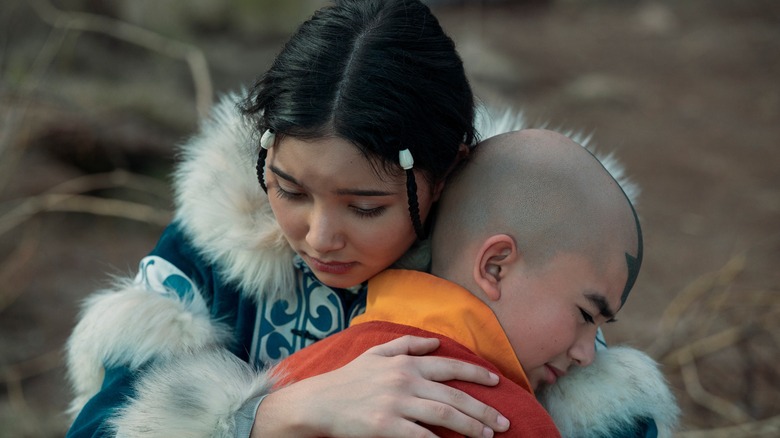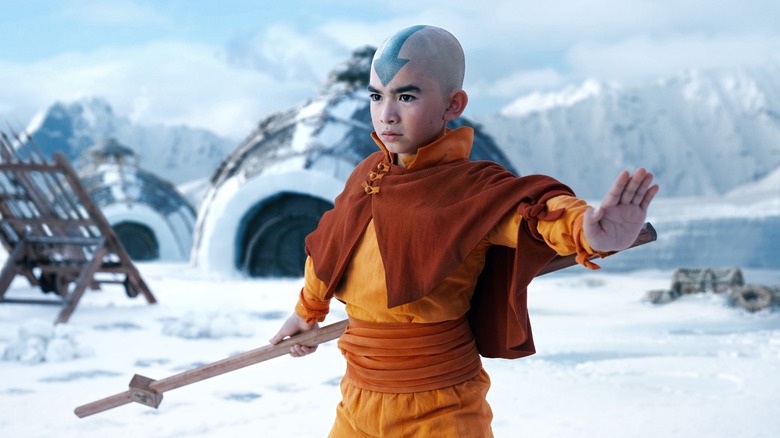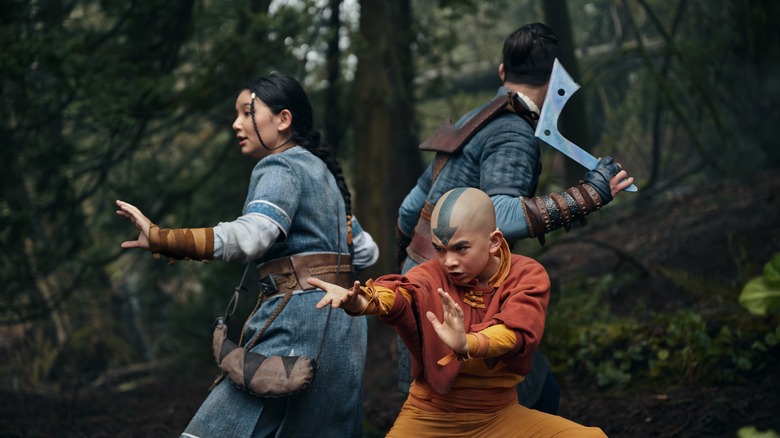Netflix's Avatar: The Last Airbender Changes Aang's Origin Story For The Worse
In the original "Avatar: The Last Airbender" cartoon, survivor's guilt is a huge part of Aang's journey, especially in Season 1. The only reason he escapes the Fire Nation's attack on his people is because he runs away, dreading the huge changes that are to come as part of his training. It's not a sudden decision, but a carefully planned flight. He struggles for a while under the elder monks' strict guidance, but he endures, right up until they decide to send him away from his friend and mentor, Gyatzo.
Of course, this isn't laid out right at the beginning of the show. The truth of Aang's origin story comes out gradually over the course of the first season, and he finally confesses to Katara in "The Storm," an early instance of the series' phenomenal character writing.
The new live-action adaptation from Netflix takes a different approach. In the interest of time, the show speeds things up, putting his discovery that he's the Avatar, his departure from the Southern Air Temple, and the Fire Nation's attack all on the same day. This rushed pacing muddies things significantly, and it also robs Aang (Gordon Cormier) of his agency in the story. He doesn't actually run away in the new show. Instead, he just hops on Appa for a brief flight to clear his head, only to get caught in a storm. This might seem like a small thing, but it changes Aang's character for the worse.
Aang running away is an important piece of his character
The fact that he ran away from his home doesn't drive Aang's entire character arc, but it's a key piece of it. No one would blame him after seeing the pressure he was put under — a 12-year-old boy being told that he's the only thing standing between the world and complete destruction. We understand why he had to leave. And yet, he struggles to forgive himself. Much of the cartoon's first season is about Aang realizing that he can't escape his responsibilities. The rest of the show is about him realizing he doesn't have to change who he is at his core in order to perform them.
By taking the first part of that arc off the table in the first episode of the live-action adaptation, Netflix severely diminishes the depth of Aang's character. Perhaps it was simply a consideration of time — a desire to lay out the whole backstory at the front of the show and get it out of the way. But that's the thing about pacing: It's there for a reason. You can't speedrun someone forgiving himself.
Aang's lack of agency in his own disappearance is made all the stranger in later episodes. Characters like King Bumi (Utkarsh Ambudkar) — a kind friend to Aang in the animated series — constantly lambast him for abandoning the world, but these moments have little emotional foundation because we know Aang had no say in his disappearance.
By speeding things up, Netflix's Avatar loses key motivations
Aang isn't the only character who suffers from the breakneck pacing at the start of Netflix's "Avatar: The Last Airbender." In the animated series, he gets multiple scenes with Katara before Zuko attacks the South Pole. She shares her desire to learn from a waterbending master, and he offers to fly her to the Northern Water Tribe to help. By the time Zuko arrests him, it's clear that the two of them and Sokka all share a fate.
In the new show, Katara (Kiawentiio) and Sokka (Ian Ousley) don't even introduce themselves to Aang onscreen. He teaches Katara a bit of bending philosophy and she tells him about the attacks on her village, but it feels more like exposition than two people really getting to know one another. Netflix eschews the scene of Gran Gran sending her grandkids on their grand adventure, instead giving Sokka a farewell scene with...some other guy in town? With no name? At no point does the first episode contend with the idea that these three are embarking on a life-changing journey.
The main problem here is that the new show wasn't written for first-timers. It's uninterested in bringing new fans into the fold. Instead, it tells the story we already know, and because we do, it skips a few steps. While the new actors playing these lead characters are solid, and occasionally great, the writing doesn't do much to help them establish meaningful relationships or motivations. It's all in a rush to get where it's going, which is a place we've already been.


